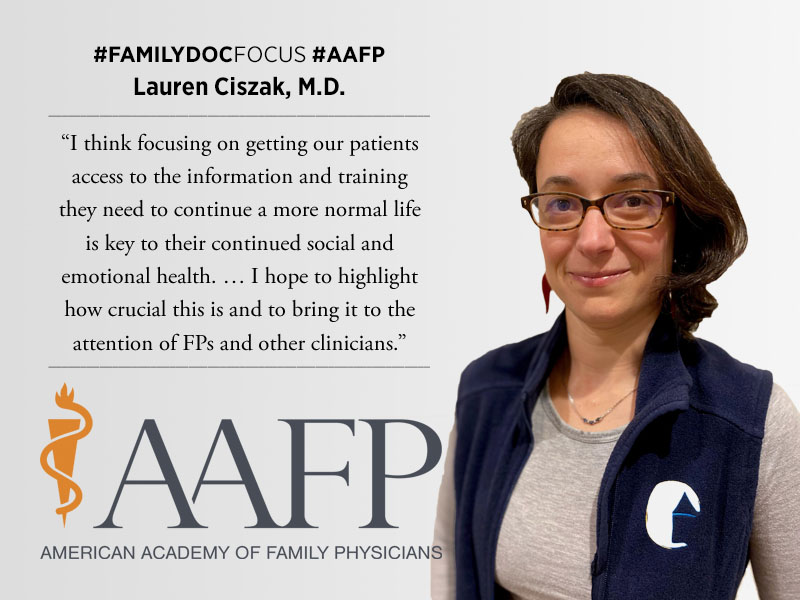Interest in Nutrition Spurred FP to Research Path
July 26, 2021, 12:50 p.m. Michael Devitt — Lauren Ciszak, M.D., a practicing family physician with the South End Community Health Center in Boston, has been interested in using nutrition to help improve her patients’ quality of life since her days as a resident, but it wasn’t until recently that she seriously considered taking that interest to the next level.

“I never really thought I had an interest in doing research, but I do find myself coming back to it again and again,” Ciszak said. “In residency, I organized a small farmer’s market at our clinic and paired it with nutrition-focused visits for patients. It allowed residents to get some hands-on nutrition education and was great for patients, too.”
A few years later, Ciszak started caring for a patient with heart failure and end-stage renal disease.
“She had Meals on Wheels delivered to her house every day, but every time she left the house with her family, she didn’t know what foods were the best for her to choose, and she always ended up in the hospital,” Ciszak explained. “After the third time this happened — she went to an Oktoberfest festival and ate one too many bratwurst — I thought, ‘Wouldn’t it be better if instead of getting meals that were already prepared, she received meals in a kit that she had to prepare herself?’ That way, she would learn what foods were high in sodium and how to avoid them, and she could share them with family members, who could also learn how to prepare them.
“And that’s how the idea came about.”
That experience — along with an email that introduced members to the Family Medicine Discovers Rapid Cycle Scientific Discovery and Innovation initiative — ultimately inspired Ciszak to take the next step.
Launched in 2019, the FMD RapSDI initiative is a partnership between the AAFP Foundation and the AAFP National Research Network. Its objective is to recruit family physicians who are interested in conducting clinical research, but who lack the time or money (or both) to move their project forward, and provide selected candidates with funding and assistance to complete their research.
Ciszak was among the first group of family physicians to apply to the program in fall 2019. Like all applicants, Ciszak participated in a rigorous process that required her to successfully complete one application round before being invited to participate in a second.
“The first round of the application was fast and easy. The second round was detailed and challenging, to be honest,” said Ciszak, who worked with AAFP NRN staff for several months to develop a full research application that included a complete research plan, study protocol, project activities and a projected budget.
Following an extensive review, Ciszak was officially named a RapSDI scholar in May 2020 and received a $39,212 grant for her research project, titled “Medically Tailored Meal Kits as a Means of Decreasing ED visits and Hospitalizations in Primary Care Patients with Chronic Disease.” She began her research the following month and completed her project in May 2021. While her findings have not been formally published, she has submitted presentations to several scientific conferences and is in the process of completing a manuscript for publication.
Ciszak said that often, both patients and physicians underestimate the impact food can have on one’s quality of life. She added that helping patients get access to nutrition-related resources could prove beneficial in ways that support them not only physically, but also socially and emotionally.
“Meals are a key time when we socialize and share with family and friends,” she said. “If patients with chronic diseases feel they have lost that ability to cook, eat out, prepare food for their families and eat together, then they are losing a key aspect of life. We’ve all had a taste of what it is like to have that ability to connect around food taken away during COVID-19 and it’s awful. I’d like to bring that back for all our patients.
“I think focusing on getting our patients access to the information and training they need to continue a more normal life is key to their continued social and emotional health,” Ciszak added. “Even if we don’t have meal kits, getting patients more access to cooking classes and nutrition education can serve a similar purpose. I hope to highlight how crucial this is and to bring it to the attention of FPs and other clinicians.”
If given the opportunity, Ciszak said she would like to build on her research to include patients with nutrition-dependent chronic conditions such as diabetes, end-stage liver disease, kidney disease, inflammatory bowel disease and celiac disease. She would also like to partner with an existing meal kit company to expand the scope and reach of her work.
As for RapSDI, Ciszak eagerly recommended that any family physicians interested in doing clinical research submit an application. The latest application period began July 1 and will remain open until 5 p.m. CT Aug. 23.